Black Swan
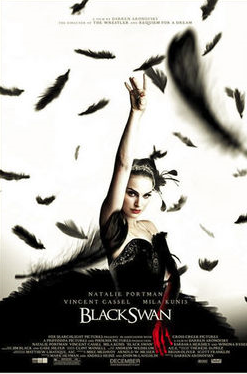
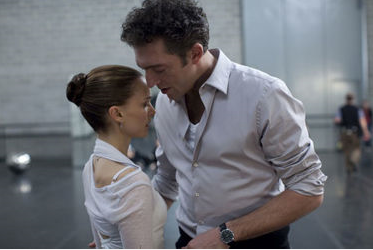 This is extremely important, as Darren Aronofsky's (The Wrestler) latest film is all about that world, and how the line between fantasy and reality begins to merge with disturbing results. By showing us this world through the main character's point of view, we are equally sympathetic and terrified by what we are seeing, much more so than if we were an outsider looking in. The approach is somewhat similar to the classic Japanese anime psychological thriller, Perfect Blue. Both films are about a rather sheltered and chaste woman and their maturing sexuality, and how it ties into a project they are working on (a crime drama in Perfect Blue, a ballet here). In both films, we get a first-hand look as the heroine loses her grip on her identity, and reality itself. The two films share just as many differences as they do similarities, but it would be wrong if Aronofsky did not at least state that the earlier film aided his vision at least a little. (He's openly admitted to being a fan of the film in past interviews, and even paid tribute to it with a scene recreation in one of his earlier films, Requiem for a Dream.)
This is extremely important, as Darren Aronofsky's (The Wrestler) latest film is all about that world, and how the line between fantasy and reality begins to merge with disturbing results. By showing us this world through the main character's point of view, we are equally sympathetic and terrified by what we are seeing, much more so than if we were an outsider looking in. The approach is somewhat similar to the classic Japanese anime psychological thriller, Perfect Blue. Both films are about a rather sheltered and chaste woman and their maturing sexuality, and how it ties into a project they are working on (a crime drama in Perfect Blue, a ballet here). In both films, we get a first-hand look as the heroine loses her grip on her identity, and reality itself. The two films share just as many differences as they do similarities, but it would be wrong if Aronofsky did not at least state that the earlier film aided his vision at least a little. (He's openly admitted to being a fan of the film in past interviews, and even paid tribute to it with a scene recreation in one of his earlier films, Requiem for a Dream.)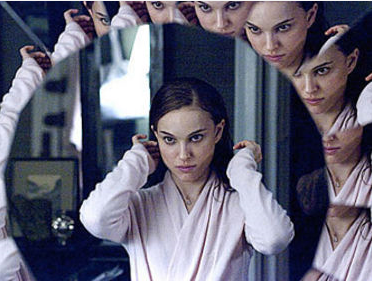 Regardless of any source of inspiration, Black Swan stands on its own as a tense and powerful psychological erotic thriller. It's one of the great films of the year. Before Aronofsky begins to play with our perception of reality, he gives us a first-hand look at the harsh behind the scenes life of a professional dancer. Much like his last film, The Wrestler, opened with an almost documentary-style look at the main character's career and what goes on behind the scenes, so too does this film. We see the lengths the dancers go to be "perfect", the dressing room gossip, and the struggle to stay at the top. We witness this early on when the director of the ballet company, Thomas Leroy (Vincent Cassel), announces that the company's star dancer, Beth (Winona Ryder) will be stepping down and retiring. Judging by Beth's reaction to this news and how she acts around him, it's not by her choice.
Regardless of any source of inspiration, Black Swan stands on its own as a tense and powerful psychological erotic thriller. It's one of the great films of the year. Before Aronofsky begins to play with our perception of reality, he gives us a first-hand look at the harsh behind the scenes life of a professional dancer. Much like his last film, The Wrestler, opened with an almost documentary-style look at the main character's career and what goes on behind the scenes, so too does this film. We see the lengths the dancers go to be "perfect", the dressing room gossip, and the struggle to stay at the top. We witness this early on when the director of the ballet company, Thomas Leroy (Vincent Cassel), announces that the company's star dancer, Beth (Winona Ryder) will be stepping down and retiring. Judging by Beth's reaction to this news and how she acts around him, it's not by her choice.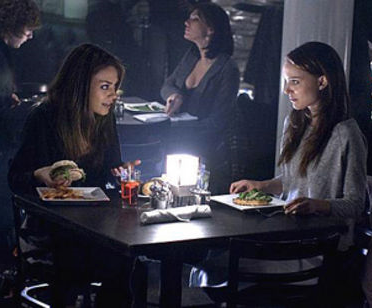 Young Nina has dreams of taking Beth's position, and getting the starring role as the Swan Princess in Leroy's revisionist production of Swan Lake. Nina is a woman of tremendous talent and dedication, but she is also extremely guarded and naive. This is something Thomas Leroy immediately recognizes. The part that Nina desires in the production is actually a dual role. She must play both the pure and virtuous White Swan (something he knows Nina would excel at), but also the seductive and dangerous Black Swan. This is where Nina has trouble. She cannot be free sexually. She is repressed. She is frightened and rigid. Thomas is willing to help her, both professionally, and ways that would seem slightly less moral. And yet, the film is careful not to make the character of Thomas Leroy into a generic slimy villain, or a pervert. He is complex, and far from the one-dimensional lusting figure a lesser film would present him as.
Young Nina has dreams of taking Beth's position, and getting the starring role as the Swan Princess in Leroy's revisionist production of Swan Lake. Nina is a woman of tremendous talent and dedication, but she is also extremely guarded and naive. This is something Thomas Leroy immediately recognizes. The part that Nina desires in the production is actually a dual role. She must play both the pure and virtuous White Swan (something he knows Nina would excel at), but also the seductive and dangerous Black Swan. This is where Nina has trouble. She cannot be free sexually. She is repressed. She is frightened and rigid. Thomas is willing to help her, both professionally, and ways that would seem slightly less moral. And yet, the film is careful not to make the character of Thomas Leroy into a generic slimy villain, or a pervert. He is complex, and far from the one-dimensional lusting figure a lesser film would present him as.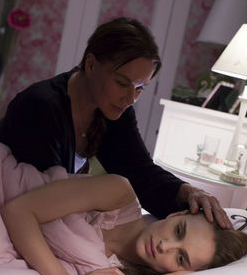 The role requires Nina to reach far deep into herself, exploring dark areas she has never dared to explore within her personality. This is where the drama lies. Nina is a suppressed woman. She is well into her 20s, but still has the fragility and timidness of an awkward 12-year-old girl on the verge of puberty. Her room is filled with toys and childhood trinkets, and her domineering mother whom she lives with (Barbara Hershey, giving a performance that's both sympathetic and terrifying) keeps her under a tight psychological grip. The role of the Black Swan forces Nina to face feelings and thoughts she has held back her entire life. And as they begin to rise to the surface (literally in some cases), they fly out of control, as does Nina herself. We begin to question along with her what is real, and what is not. Some are clearly horrific delusions made up in her own mind, but there are some that we find ourselves questioning right along with her.
The role requires Nina to reach far deep into herself, exploring dark areas she has never dared to explore within her personality. This is where the drama lies. Nina is a suppressed woman. She is well into her 20s, but still has the fragility and timidness of an awkward 12-year-old girl on the verge of puberty. Her room is filled with toys and childhood trinkets, and her domineering mother whom she lives with (Barbara Hershey, giving a performance that's both sympathetic and terrifying) keeps her under a tight psychological grip. The role of the Black Swan forces Nina to face feelings and thoughts she has held back her entire life. And as they begin to rise to the surface (literally in some cases), they fly out of control, as does Nina herself. We begin to question along with her what is real, and what is not. Some are clearly horrific delusions made up in her own mind, but there are some that we find ourselves questioning right along with her.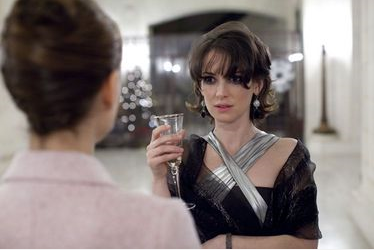 And then there is Lily, the newest dancer to join the company. She's played by Mila Kunis, and in a film filled with noteworthy performances (both Portman and Hershey should be locks at award time), she is the real breakthrough to me. Having mainly worked on television, and slowly moving toward film, Kunis gives the best performance of her career as the complicated figure who is either trying to befriend Nina, or destroy her. The character of Lily is intentionally kept at a distance, as Nina is not sure what to make of her, so neither are we. She is the main source of Nina's paranoia that someone will come and upstage her, just like what happened with Beth. Lily seems to represent a lot in Nina's eyes. She represents fear, freedom (both sexually and emotionally), and power. It's that last part that the movie is intentionally vague on. Is Lily truly overpowering Nina, or is it simply Nina supplying this woman power with her own fear? We can certainly make our own assumptions (and we do), but the movie is wise not to spell everything out.
And then there is Lily, the newest dancer to join the company. She's played by Mila Kunis, and in a film filled with noteworthy performances (both Portman and Hershey should be locks at award time), she is the real breakthrough to me. Having mainly worked on television, and slowly moving toward film, Kunis gives the best performance of her career as the complicated figure who is either trying to befriend Nina, or destroy her. The character of Lily is intentionally kept at a distance, as Nina is not sure what to make of her, so neither are we. She is the main source of Nina's paranoia that someone will come and upstage her, just like what happened with Beth. Lily seems to represent a lot in Nina's eyes. She represents fear, freedom (both sexually and emotionally), and power. It's that last part that the movie is intentionally vague on. Is Lily truly overpowering Nina, or is it simply Nina supplying this woman power with her own fear? We can certainly make our own assumptions (and we do), but the movie is wise not to spell everything out.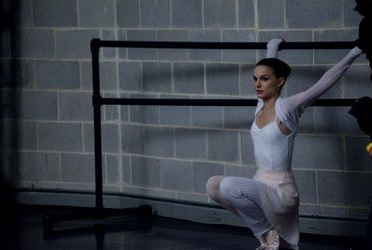 It's this skewed view of events that make Black Swan so compelling. We know that Nina is not a reliable narrator, and yet, we are forced to view the events through her eyes. We can create our own assumptions of what really happened, which are usually quite the opposite of what we are watching up on the screen. Some critics of the film have complained about the melodramatic and sometimes bombastic nature of the narrative, but again, I think this ties into the story that Aronofsky is trying to tell. It also once again ties into the "unreliable narrator" angle. We are not watching a realistic reenactment of events. The story takes frequent trips into fantasy, horror, and psychological drama. We are constantly watching a fevered mind trying to sort out fantasy and reality.
It's this skewed view of events that make Black Swan so compelling. We know that Nina is not a reliable narrator, and yet, we are forced to view the events through her eyes. We can create our own assumptions of what really happened, which are usually quite the opposite of what we are watching up on the screen. Some critics of the film have complained about the melodramatic and sometimes bombastic nature of the narrative, but again, I think this ties into the story that Aronofsky is trying to tell. It also once again ties into the "unreliable narrator" angle. We are not watching a realistic reenactment of events. The story takes frequent trips into fantasy, horror, and psychological drama. We are constantly watching a fevered mind trying to sort out fantasy and reality.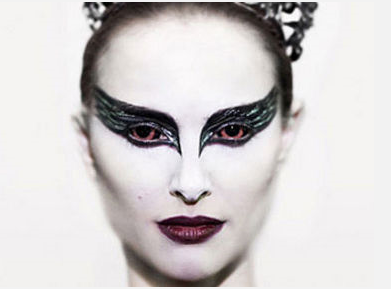
See the movie times in your area or buy the DVD at Amazon.com!






0 Comments:
Post a Comment
<< Home